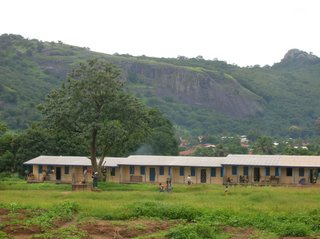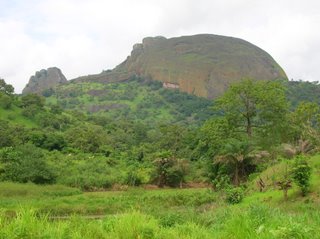A few hours later, peering sheepishly at the clock on the wall and bemoaning the rain, which had not let up in the slightest, I finally dragged myself out of bed and into the shockingly cold shower. I’d allowed myself a lazy morning because I’d be sticking around work for a 10 p.m. videoconference (that’s what you get coordinating across Washington, Freetown, and Sydney), but I figured lying in bed still at 9:30 was pushing it.
And so, my pants rolled up to my knees and my feet encased in the clammy smelliness of my rain sneakers, I ventured forth into the dismal day. Our compound was mostly deserted: the kids peeked out at me from the back door, and my dedicated helper (houseboy/little brother/friend) Idrissa emerged from the dry comfort of the house to open the gate and close it behind me, but otherwise all I saw were two very soggy and pathetic chickens trying to shelter by the garage door.
It’s enough to make me positively yearn for the sunshine of Senegal, in which I basked shamelessly last week. Not to overstate things – it’s also rainy season in Senegal, and we did get drenched once or twice – but the weather there was spectacular compared to today. I still have the tan (and peeling shoulders) to show for several days of delighted sun worship: first while wandering around Goree Island (see photos) – a stunning place filled with bright Mediterranean colors, and with a somewhat contested historical legacy as a slave gateway – and then exploring the beach-turned-artist’s colony, Toubab Diallo.
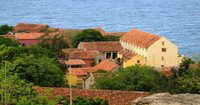
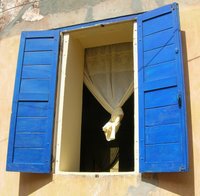
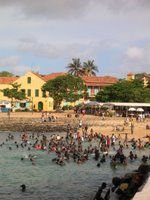
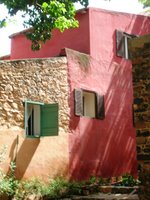

I was in Senegal for a quick getaway with a friend from the States who had come all the way to West Africa to visit me. I figured Salone alone wasn’t enough to warrant the trip – and besides, was looking for an excuse myself to get out of town for a few days – and so we headed north a few hundred miles (by air, of course) to the French-speaking Senegal.
The contrasts between Senegal and Sierra Leone were striking (if predictable). Senegal is much more industrialized and much less poor than Sierra Leone. Dakar is officially twice the size of Freetown but feels much larger, with modern (if somewhat crumbly) high-rises, fully tarred (if often potholed) roads, and an arid flatness that stood in stark opposition to the lush forested hills of the Freetown peninsula.
I was fascinated by the trappings of modernity: Nando's fast-food chicken (a favorite from my days in South Africa), Mobil mini-marts with fully-stocked shelves, streetlights. Jason was fascinated by the mosquitoes – considerably more vicious than in Salone – and by the fact that all the street sellers spoke to him in Italian. (Dakar is a destination for European tourists, and we were usually pegged as either Spanish, to my delight, or Italian, to Jason’s delight.) The tourist traffic means that Dakar also sports a full retinue of vendors and con artists, all eager to talk, sell, guide... Freetown, on the other hand, is a vacation destination for – well, for the rare intrepid souls like Jason, and those living in places like Monrovia or Conakry – and thus tends to leave you to your own devices.
My favorite part of the trip, by far, was an evening of live music with a new friend and freelance journalist, Rose. (See her wonderful blog, now linked from mine.) Senegal is known for its music – having produced, among many others, the legendary Youssou Ndour – and Rose is a bit of an expert, writing extensively on West African music. I had never met her, but used the kind of thin connection that only works on the far side of the world – “I used to hang out with your brother’s girlfriend’s butler” – to convince her to take us out for a night on the town. And it was well worth it: ensconced in low comfy couches in a tiny lounge, just a few feet from the musicians, I soaked in the kind of rich, melodic, soul-stirring music that I long for here. (In Freetown, a “live” show is actually someone lip-syncing to their own recording, which itself involves no instrumentation beyond an electronic keyboard. Entertaining in its own right, but no Youssou Ndour.)
On the whole, though, I did not fall in love with Senegal or the Senegalese. To be fair, the fault lay in large part in my own inability to communicate with anyone we met. (Despite the best of intentions, I arrived in the country able to say little more in French than “I don’t understand” and “Where is the toilet?”) Perhaps the most entertaining consequence was one memorable night at a swanky Dakar establishment, where the bartender – who spoke not a word of English – decided to try to woo me via Jason. At one point, when I went to the bathroom, he spent several minutes trying to determine my marital status; Jason, though he understood the gist of the question, was not sure whether he was being asked if I was married or if I was single (an important distinction for a Yes or No question). It was all a bit like junior high, when you’d approach the best friend of the girl you liked instead of the girl herself. I spent most of the night in silent bemusement, looking back and forth between Jason and the bartender (at least 10 years my senior, by the way) as they struggled to communicate. Needless to say (?) Monsieur Bartender and I did not ride off into the sunset together, but Jason and I did get free drinks all night. That’s something.
But language difficulties (and generous bartenders) aside, I found the Senegalese to be much less warm than Sierra Leoneans. (Perhaps tellingly, the nicest woman we met – proprietress of a small eatery on the beach in Toubab Diallo – turned out to be from Sierra Leone.) Though I feel bad making the comparison, I’m also somewhat delighted to find that I’ve become so partial to Salone and Salonians. Just give this country a little time to fix up the roads and rebuild the hotels and the tourists will be coming in droves.
And on that note, out into the rainy night I go…

